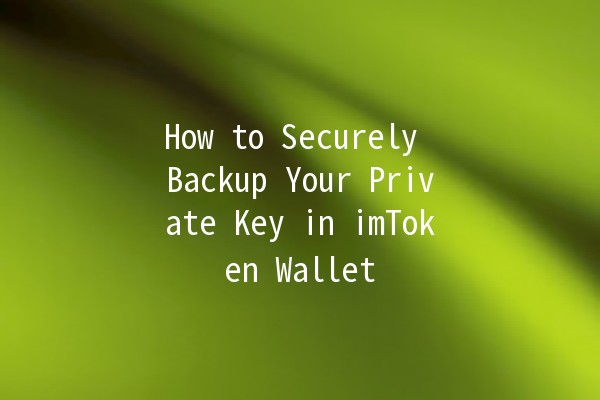In the realm of cryptocurrency, safeguarding your assets is paramount. One of the key components of security is the proper management of your wallet’s private keys. imToken wallet is a popular choice among users for its userfriendly interface and robust security features. This article outlines effective methods for backing up your private keys to ensure your digital assets remain safe and accessible.
Before delving into backup methods, it's crucial to understand what a private key is. In simple terms, a private key is a string of characters that functions like a password to access your cryptocurrency wallet. Losing your private key means you could potentially lose access to your funds entirely.
Having a backup of your private key is akin to having a spare key for your home; it allows you to regain access if you misplace the original. Here are some compelling reasons to back up your private key:

Here are five practical strategies to effectively secure your imToken private keys:
Explanation: A hardware wallet is an external device that stores your private keys offline, making it less susceptible to hacking.
Application Example: If you own a Ledger or Trezor hardware wallet, you can transfer your imToken private keys to these devices. This allows you to keep your private keys secure while still being able to interact with your assets when needed.
Explanation: This classic method involves physically writing down your private key on paper and storing it in a secure location.
Application Example: After retrieving your private key from your imToken wallet, write it down on a piece of paper. Then, keep this paper in a safe, secure location, such as a safe deposit box or a personal safe at home. Ensure that no one else has access to it.
Explanation: Redundancy is key in security. Backing up your private key in different locations prevents loss from localized disasters.
Application Example: Consider having one backup in your home safe and another one with a trusted family member. This way, if something were to happen at one location, you still have access to your funds through the other.
Explanation: If you prefer digital methods, using a secure note app that offers encryption can be a suitable option for backing up your private key.
Application Example: Applications like Evernote or OneNote allow you to create encrypted notes. Write your private key in a secured note and store it within the app. Make sure the app itself is secured with a strong password and, if possible, twofactor authentication.
Explanation: Always have multiple backups to ensure you'll never be caught off guard if something goes wrong with one of your backup methods.
Application Example: After backing up your private key on paper and an encrypted digital note, consider also uploading it to a cloud service with strong encryption. However, ensure that you use a unique pseudonym and password for that cloud service, and enable twofactor authentication for added security.
Losing your private key generally means you lose access to your funds permanently. However, if you have a backup, retrieve it from your storage method and access your wallet accordingly.
Yes, storing your private key on a digital device can expose you to risks such as malware or hacking attempts. It's advisable to use secure and encrypted methods for digital storage.
You should update your private key backup whenever you make changes to your wallet or if you have any reason to doubt the integrity of your storage methods.
While software wallets can be convenient, they are inherently less secure than hardware wallets. If you choose software solutions, ensure that they have a good reputation and robust security measures.
Never share your private key with anyone. Doing so gives them full access to your funds, which can lead to theft or loss.
Use strong, unique passwords for any digital storage solutions, enable twofactor authentication, and consider using encryption for files containing sensitive information, including your private key.
By following the outlined practices and understanding the significance of securing your private keys, you can significantly mitigate the risks associated with digital asset storage. With the right precautions, the imToken wallet can serve as a reliable tool in managing and protecting your cryptocurrency investments.